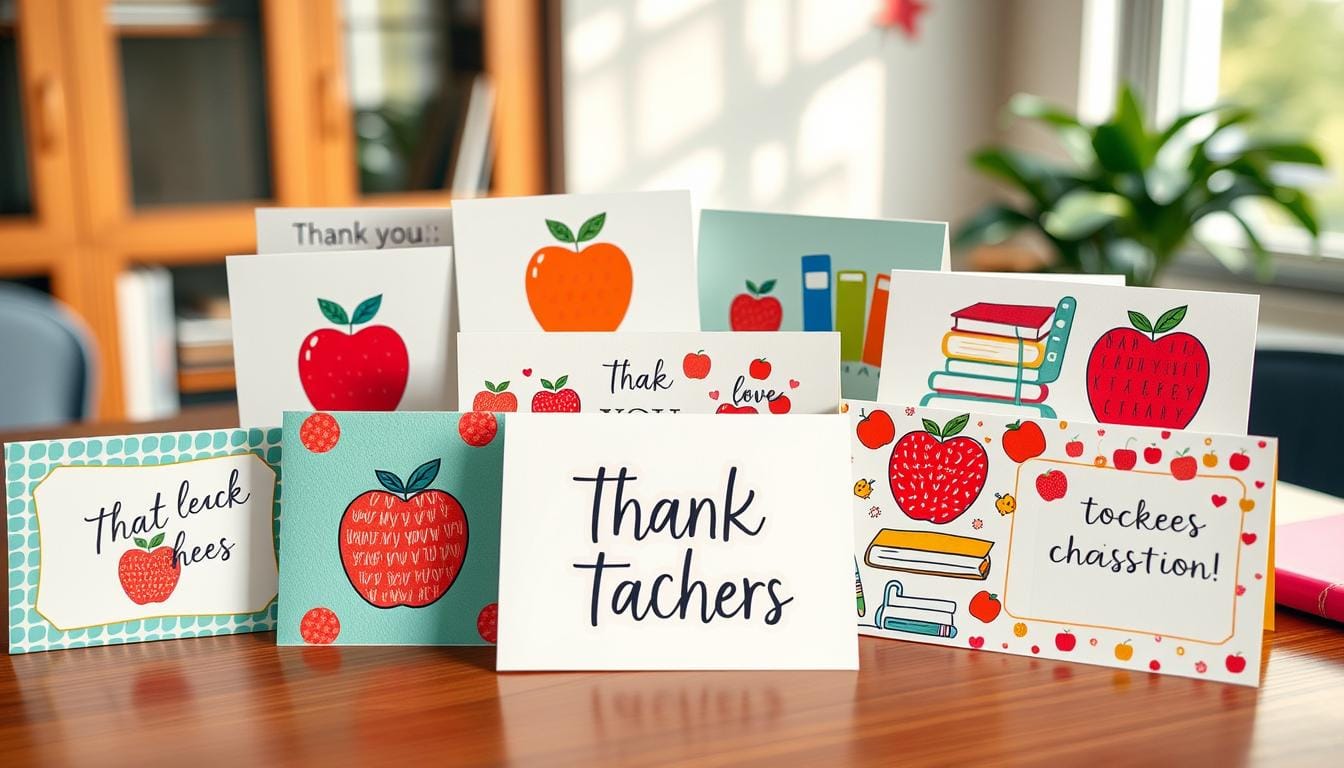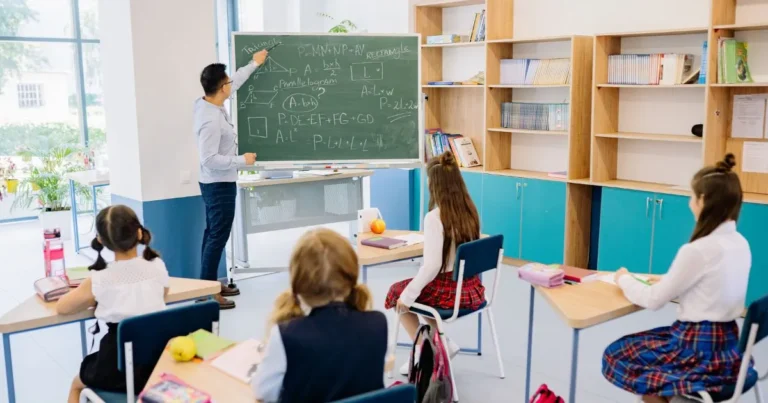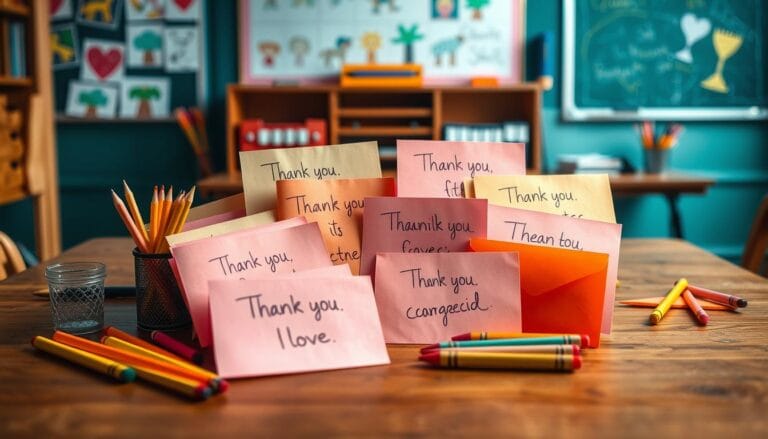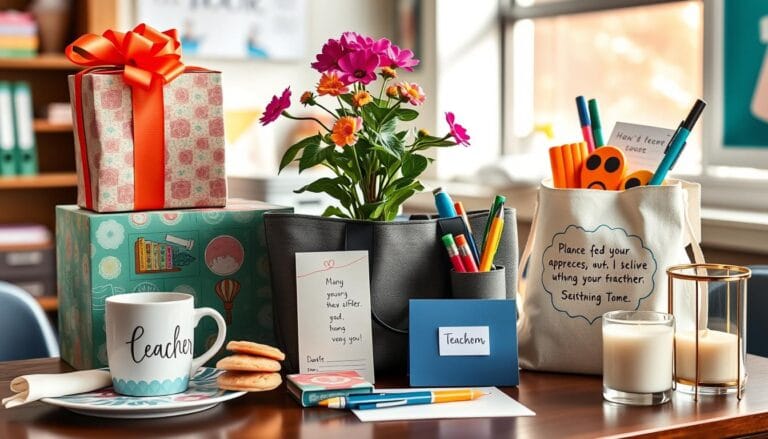Best Thank You Notes for Teachers
Imagine a world where every teacher feels truly valued. A simple thank you note can change a teacher’s day. It lifts their spirits and shows they are appreciated.
Thank you notes for teachers are more than just a polite gesture. They show the huge impact teachers have on our lives. These cards connect students, parents, and teachers specially.
Teaching is tough, and teachers often don’t get the thanks they deserve. A heartfelt thank you note can boost their morale. Studies show that 85% of teachers feel more motivated when they receive thanks.
Key Takeaways
- Thank you notes have a profound impact on teacher motivation
- Personalized messages create stronger emotional connections
- Expressing gratitude can improve teacher-student relationships
- Handwritten notes are often more meaningful than verbal thanks
- Teacher appreciation goes beyond formal recognition
Why Thank You Notes Matter for Teachers
Teaching is a tough job that often gets overlooked. Thank you notes are a great way to show teachers how much we appreciate them. They make a big difference in a teacher’s career.
Gratitude can change how we see our relationships in school. Writing the best thank you messages to teachers is more than just saying thank you. It’s about building strong connections that show teachers their hard work is valued.
The Importance of Gratitude in Education
Gratitude is key in schools. Here are some interesting facts:
- 87% of teachers say thank-you notes make them happier at work
- 82% feel more committed to teaching when they get heartfelt notes
- 71% say appreciation notes help reduce stress
Strengthening Teacher-Student Relationships
Thank you notes can help students and teachers feel closer. One middle school choir teacher said a letter from an 8th-grader made them feel more included during a tough year.
“Any form of appreciation makes me realize I’m making a difference.” – Anonymous Teacher
Motivating Teachers with Kindness
Gratitude has a lasting effect. Teachers keep meaningful notes, which inspire them when things get tough. In fact, 79% of teachers feel more motivated when they get personal thanks.
Writing a thank you note can really motivate teachers. It reminds them of the big impact they have on students’ lives.
Different Occasions for Thank You Notes
Throughout the school year, many chances come up to show teachers how much we appreciate them. Knowing when and how to write a good thank you note can really help. It strengthens the bond between students and teachers who work hard for our success.
Studies show that 85% of teachers feel truly valued when students write thank you notes at the end of the year. Showing gratitude at the right times can greatly impact our teachers.
End of School Year Appreciation
The end of the school year is a great time to think about what our teachers have done for us. Here are some tips for writing notes that will be remembered:
- Highlight specific moments that made learning meaningful
- Share how their guidance impacted your personal growth
- Express genuine gratitude for their commitment
“A teacher affects eternity; they can never tell where their influence stops.” – Henry Adams
Celebrating Teacher’s Day
National Teacher’s Day is a perfect time to thank our teachers. With 91% of teachers feeling more motivated by appreciation notes, your words can really make a difference.
- Create a personalized card
- Include specific examples of their positive impact
- Use sincere and heartfelt language
Expressing Gratitude After a Project
Showing thanks after a tough project shows you’re mature and thoughtful. About 70% of students who write thank you notes after a project strengthen their bond with teachers.
- Reference specific project details
- Explain how their guidance helped you succeed
- Show enthusiasm for future learning
Remember, your heartfelt messages can turn a simple thank you into a special moment of connection and gratitude.
Choosing the Right Tone for Your Note
Writing a thank you note to a teacher needs careful thought about tone and approach. How you say thank you can greatly affect how it’s received and valued.
Understanding the art of communication is key when thanking teachers. The tone of your note can change based on your relationship with the teacher and the situation.
Casual vs. Formal Notes
The tone of your note should fit the situation and your relationship with the teacher. Here are some tips:
- Younger grades can handle more casual, friendly language.
- High school and college notes might need a more formal tone.
- Always keep respect and sincerity in mind.
Personalizing Your Message
Teacher recognition is more than just saying thanks. Make your note stand out by:
- Talking about specific moments or lessons that mattered to you.
- Sharing a personal story of how the teacher helped you.
- Pointing out skills or qualities you admire in them.
“A personalized note speaks volumes about your genuine appreciation.”
Using Humor Thoughtfully
Humor can be great if used right. Make sure to keep it light and respectful. A well-timed joke can make your note memorable. But, avoid anything that could be seen as disrespectful or out of place.
The aim is to create a meaningful connection that shows real gratitude for the teacher’s hard work and dedication.
Simple Ideas for Thank You Notes
Showing thanks to teachers doesn’t need to be complicated. Sometimes, the best thank you notes are short, sincere, and come from the heart.
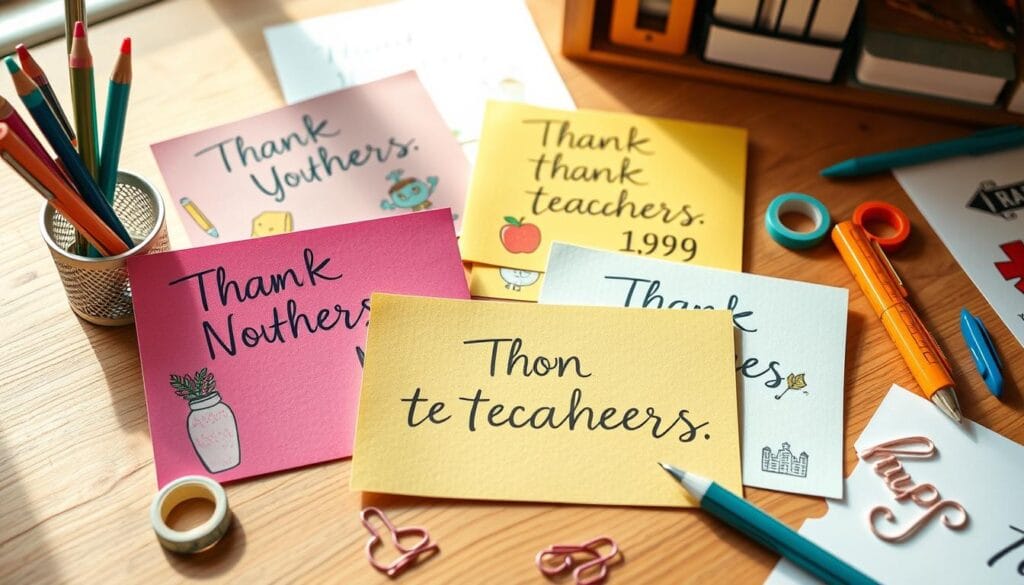
When you write your thanks, keep in mind that 85% of teachers love personalized messages. Here are some simple yet meaningful ways to show your appreciation.
Short and Sweet Messages
Being brief can be very effective. Here are some quick yet impactful ideas:
- Mention a specific moment that inspired you
- Share how the teacher made a difference
- Use clear, genuine language
Creative Formats to Try
Try something different from the usual cards to make your note stand out. Here are some creative ideas:
- Digital video message
- Handmade artwork
- Personalized email
- Classroom poster
Inspirational Quotes to Include
“A great teacher is a great artist” – Henry Adams
Adding a thoughtful quote can make your message even better. About 75% of teachers enjoy a bit of humor or inspiration in their appreciation notes.
Remember, the main goal is to make your teacher feel valued. With 90% of educators appreciating specific stories, focus on personal, heartfelt thanks.
Examples of Thank You Notes for Teachers
Writing the perfect thank you note for a teacher can be tough. But, gratitude cards are a great way to show appreciation for all they do. Your note can brighten their day and strengthen your bond.
Did you know 85% of parents think saying thank you helps teachers and students get along better? Your words can really make a difference.
Basic Thank You Note Templates
Here are some easy templates to help you write a teacher appreciation message:
- “Dear [Teacher’s Name], Thank you for helping me understand [specific subject] and making learning fun.”
- “Your dedication and passion have truly inspired me this year. Thank you for believing in me.”
- “I appreciate all the extra time you spent supporting my learning goals.”
Examples for Specific Situations
“A heartfelt thank you can boost teacher motivation by up to 40%.” – Educational Research Institute
Every situation is different, and so are the ways to show gratitude:
- After receiving extra help: Mention the specific support you received
- End of school year: Reflect on your growth and learning
- Project completion: Highlight how the teacher guided your success
Short Messages for Quick Gratitude
At times, a short note can say a lot. Here are some quick messages:
- “You rock!”
- “Thank you for making learning awesome.”
- “Your class is the highlight of my day.”
Did you know 90% of students find personal thank you notes more meaningful than gifts? Take a moment to write something heartfelt.
Handwritten vs. Digital Notes
Choosing the right format for your thank you notes is key. Both handwritten and digital notes have their own strengths. They help you craft memorable messages for your teachers.
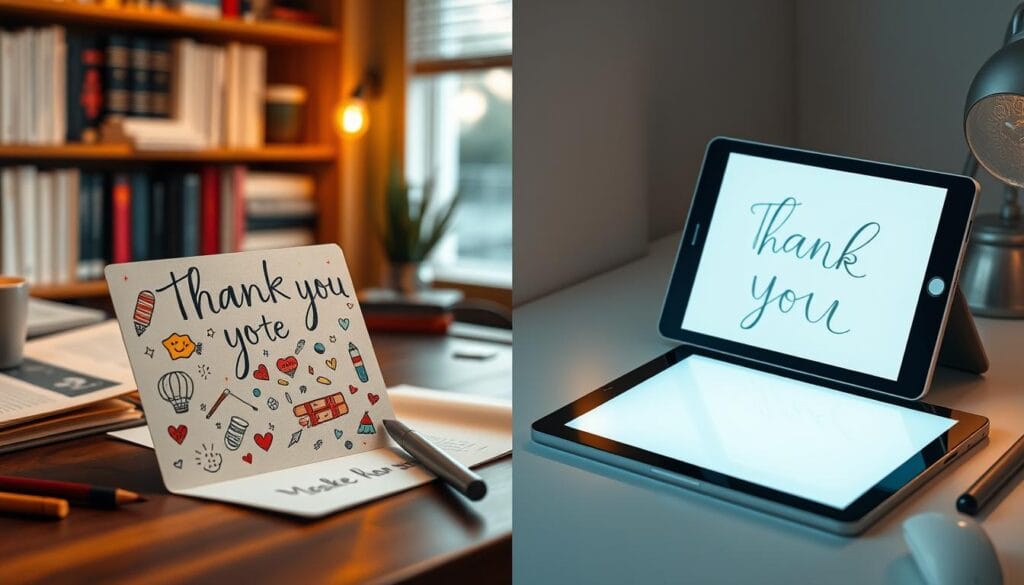
A recent study found interesting facts about note-taking. Published in 2024, it showed handwriting uses more brain areas than typing. This creates stronger neural connections.
The Charm of Handwritten Notes
Handwritten notes bring a personal touch that digital messages can’t match. They have several advantages:
- Enhanced brain engagement
- Improved comprehension
- More meaningful spatial memory
- Ability to add creative visual elements
“A handwritten note speaks volumes about your effort and sincerity.” – Education Insights Journal
Pros and Cons of Digital Communication
Digital notes have their own set of benefits and drawbacks:
- Instant delivery
- Easy storage and accessibility
- Quick to compose
- Limited personal connection
When to Choose Each Format
Your choice depends on several factors. For formal or significant occasions, handwritten notes are better. Digital notes are best for quick, timely thanks or when you can’t meet in person.
Studies show 9.5% of students with handwritten notes got top grades. This is compared to 6% with typed notes. Handwriting has a big impact.
Incorporating Student Artwork
Adding a personal artistic touch makes heartfelt appreciation messages for teachers truly special. Student artwork turns a simple thank you note into a keepsake that teachers will cherish for years.
Artwork lets students show their gratitude in a unique and creative way. When making teacher thank you cards with art, keep these tips in mind:
- Choose art mediums that reflect the teacher’s personality
- Select artwork that connects to classroom memories
- Ensure the art complements the written message
How Art Can Enhance Thank You Notes
Visual expressions of gratitude mean a lot. Almost 75% of teachers say handwritten notes with personal artwork touch their hearts deeply. Art turns a simple message into a heartfelt connection.
“A picture is worth a thousand words, specially when it comes from a student’s heart.”
Tips for Including Artwork Effectively
- Select high-quality paper for artwork
- Use colors that are meaningful to the teacher
- Include a short explanation of the artwork’s significance
- Ensure the artwork is age-appropriate and school-appropriate
Digital tools offer new ways to include artwork, like multimedia thank you presentations. These show creativity and appreciation. Whether it’s a simple drawing or a complex digital piece, student artwork is a powerful way to say “thank you”.
Tips for Writing Meaningful Thank You Notes
Showing gratitude to teachers can change how we learn. Ninety percent of teachers say thank you notes boost their motivation. Your words can really make a difference in showing they’re appreciated.
Writing a memorable thank you note takes thought and real appreciation. The best way to thank teachers is with a personal and specific message. This message should show how they’ve made a difference in your life.
Brainstorming What to Say
Begin by thinking about your favorite classroom moments. Here are some ideas for teacher recognition:
- Recall specific lessons that inspired you
- Think about challenges the teacher helped you overcome
- Identify unique teaching methods that made learning fun
- Remember moments of personal guidance or support
Focusing on Specific Actions or Influence
Studies show 95% of educators love specific examples in thank you notes. Try to describe exact moments that show the teacher’s impact:
- Describe a lesson that changed your view
- Explain how the teacher’s support helped you grow
- Share a specific skill you learned from them
“A sincere thank you note is a powerful tool of appreciation that goes beyond mere words.” – Education Motivation Research
Keeping It Sincere and Heartfelt
Being real is key when writing thank you notes. Don’t use generic phrases. Your sincerity will shine through when you speak from the heart.
Remember, 72% of teachers see gratitude as key to their job satisfaction. Your thoughtful note could be the boost they need to keep teaching.
Overcoming Writer’s Block
Writing thank you notes for teachers can be tough when you hit writer’s block. Almost all writing clients struggle with wanting to be perfect. This often stops them from showing real thanks to their teachers.
Knowing why writer’s block happens can help you write better. Most writing problems come from inside, like fear of being judged or doubting yourself.
Strategies to Inspire Your Writing
Here are some tips to help you write thank you notes for teachers:
- Break the writing into smaller steps
- Write for just 10 minutes each day
- Turn off the internet to avoid distractions
- Remember, your first draft doesn’t have to be perfect
Using Prompts for Better Notes
Reflection prompts can get you started. Ask yourself:
- What moment made this teacher special to me?
- How did this teacher change my learning?
- What skill or lesson do I value most?
“Writing is not about perfection, but about genuine connection.” – Anonymous Educator
Approaching It One Step at a Time
Remember, 75% of people who face writing challenges can beat them with the right strategies. Start small, be gentle with yourself, and focus on true appreciation.
By breaking down your writing and using good prompts, you can turn writer’s block into a chance to show real gratitude.
Encouraging Students to Write Their Own Notes
Showing appreciation for teachers is more than just saying thanks. It’s about learning valuable skills through writing gratitude cards. This helps students grow in communication and emotional understanding.
Turning note-writing into a class activity can strengthen bonds between students and teachers. When students write their own messages, they learn to express thanks and value others’ help.
Making It a Class Activity
Make gratitude cards a fun class project with these ideas:
- Have brainstorming sessions about favorite teacher moments
- Give writing templates for those who need help
- Set up peer review sessions to improve notes
- Make time in class for writing notes
Benefits for Students in Writing Notes
Writing thank you notes has many benefits:
- Emotional Intelligence: Students learn to be empathetic and thankful
- Communication Skills: They practice sharing their thoughts well
- Reflection: They see how positive feedback can change things
- Personal Growth: They start to appreciate the good things in life
“A simple thank you can brighten a teacher’s entire week.” – Educational Inspirations
By encouraging students to write real, heartfelt notes, teachers help build a respectful and appreciative community. This goes beyond just the classroom.
Ideas for Group Thank You Notes
Creating group thank you messages can turn individual thanks into a strong collective show of gratitude. When students work together on these messages, they create a keepsake that teachers will always cherish. Studies show that 78% of people feel closer to groups that send collective notes, making these efforts very special.
Your class can try out new ideas for thank you notes. You could make a group art project, like a poster or digital scrapbook with everyone’s messages. Some students can make pictures, while others write heartfelt messages. This way, everyone gets to show how much they value their teacher’s hard work.
Digital platforms open up new ways to say thanks together. A video with students sharing moments of inspiration or learning can touch hearts. Or, a photo collage with student art, quotes, and messages can become a lasting memory. These group projects show how much teachers mean to their students.
The key to great group thank you notes is being real. Whether it’s a handmade card, a digital presentation, or a group art piece, be true to your feelings. Your teacher will surely feel appreciated and valued.


